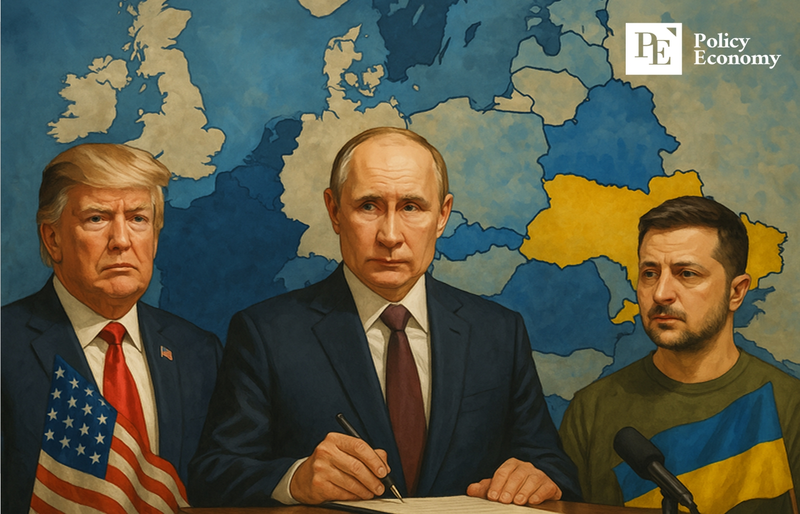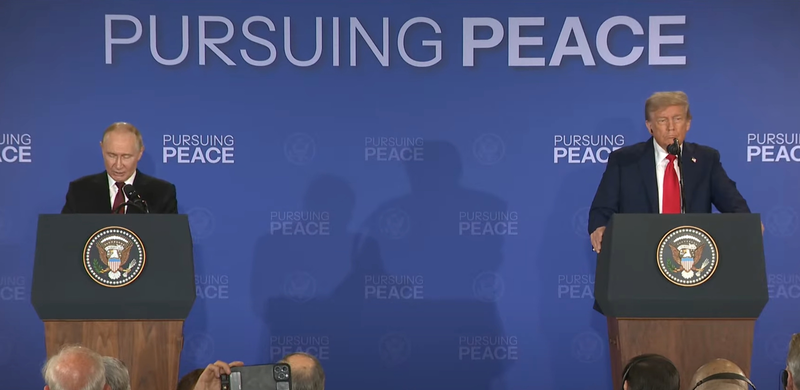Trump Weighs Putin’s ‘Donbas Transfer’ Proposal, Seeks Security Leverage for Ukraine
Input
Modified
Trump’s Call for ‘Immediate Ceasefire,’ Deadlock Controversy Diplomatic Leverage Against China Through Russia European Leaders’ Attendance at White House Talks with Ukraine

Russian President Vladimir Putin proposed during the U.S.-Russia summit that if Ukraine relinquished the eastern Donbas region, Moscow would freeze the southern front and halt its offensives. President Donald Trump, while agreeing to Putin’s proposal in pursuit of a peace accord, indicated in return the possibility of Western troop deployments inside Ukraine and U.S. security guarantees. Consequently, the meeting on August 18 at the White House between Trump and Ukrainian President Volodymyr Zelensky is expected to see an intense tug-of-war over “territorial concessions” and “security assurances.”
Trump Pushes ‘Immediate Ceasefire,’ but Summit Ends Without a Deal
During the talks, Putin proposed that if Ukraine relinquished the eastern Donbas region, Russia would freeze the southern front and halt further offensives. Trump signaled willingness to endorse the proposal in pursuit of a peace accord, suggesting in return the prospect of Western military deployment inside Ukraine and U.S. security guarantees. As a result, the upcoming meeting on August 18 between Trump and Ukrainian President Volodymyr Zelensky at the White House is expected to center on a fierce tug-of-war over “territorial concessions” versus “security assurances.”
According to Axios on August 17, citing multiple sources, Putin told Trump that if Ukraine fully ceded Luhansk and Donetsk, Russia would stop additional offensives in Kherson and Zaporizhzhia and lock the front line. Russia currently controls nearly all of Luhansk and around 70% of Donetsk, both strategic strongholds long defended by Ukrainian forces. Kyiv has consistently opposed any territorial handover.
Trump was reported to support Moscow’s framework. European leaders were informed by Trump that “a swift peace deal is possible if Ukraine concedes Donbas.” Sanctions against Russia were notably absent from the conversation. Prior to the summit, Trump had warned of “serious consequences” should Russia refuse a ceasefire, including expanded sanctions. Yet, after failing to reach an accord, he shifted his position, declaring that “the best way to end the war is not merely a ceasefire but a direct peace treaty.”
The talks, initially framed around an “immediate ceasefire,” ended without progress, prompting criticism. Axios noted that Putin offered no real concessions beyond front-line stagnation, merely rebranding Russia’s inability to advance in Donbas as a negotiating offer. The New York Times argued that Trump “walked away without securing a ceasefire, sanctions framework, or deadline, effectively granting Putin a free pass to prolong the war indefinitely.”

Strategic Gains Seen Despite Perceptions of Concession
Some observers argue Trump still extracted strategic benefits. He described the summit as “a perfect 10 out of 10,” praising three hours of “deep negotiations” and claiming “substantial progress on many fronts.” Trump underscored that “it is good for two nuclear powers to get along,” adding that the meeting relieved pressure to revisit tariffs against China, implying greater maneuvering space on trade.
In a subsequent Fox News interview, Trump stated he would not “for now” impose retaliatory tariffs or secondary sanctions over China’s purchases of Russian crude, though he left the option open “within 2–3 weeks.” Washington has long warned of punitive measures if Moscow made no effort toward ending the war, with secondary sanctions threatened against countries importing Russian oil. China and India are the largest buyers. While Trump slapped a 25% tariff on Indian goods last week over oil imports from Russia, no similar measure was applied to China.
Russia, for its part, secured meaningful reprieve. By blocking Western calls for an immediate ceasefire, it maintained justification to continue the war, while gaining a pause on sanctions Trump had previously threatened. The prospect of retaliatory tariffs on Russian crude flowing to China and India has also been deferred, easing pressure on Moscow’s trade. Furthermore, Russia positioned itself advantageously for future negotiations by finding limited alignment with Washington over Donbas.
At the post-summit press conference, Putin stressed, “We are convinced the root causes of this conflict must be removed to reach a lasting settlement. Russia’s legitimate concerns must be addressed, and a fair security balance restored in Europe and globally.” He added that he agreed with Trump’s view that Ukraine’s security “must be naturally ensured” and said Moscow was “ready to work for that.” Putin also floated the idea of another meeting in Moscow, to which Trump responded, “That could be possible.”
Showdown Ahead: Territorial Integrity vs. Security Guarantees
Attention now turns to the Trump-Zelensky summit. Trump’s vision involves a trilateral meeting with Putin to finalize a peace accord, but its feasibility hinges on Zelensky’s acceptance of Moscow’s conditions. Kyiv reacted critically on social media, recalling Russia’s repeated disregard of ceasefire calls and warning that “efforts to end a three-and-a-half-year-long devastating war are becoming increasingly complicated.”
The core issues will be whether to cede Donbas to Russia and what security guarantees the West can offer Ukraine. While Zelensky has maintained a firm stance against surrendering territory such as Donetsk, the Financial Times reported he has signaled some openness to discussing it at the upcoming talks. Security guarantees for Ukraine, a long-standing demand by Zelensky, will also be a central point. Trump has hinted at the possible stationing of Western forces in Ukraine as a quid pro quo for territorial concessions.
European leaders remain wary, stressing vigilance against Moscow despite the dilemma of “securing guarantees versus preserving territory.” French President Emmanuel Macron warned that Putin had already violated the Minsk accords. The European Union emphasized Ukraine must receive “ironclad security guarantees” and that NATO membership rights cannot be curtailed. To underscore solidarity, European Commission President Ursula von der Leyen, NATO Secretary-General Mark Rutte, and leaders of Germany and France plan to accompany Zelensky to the White House meeting with Trump.





















